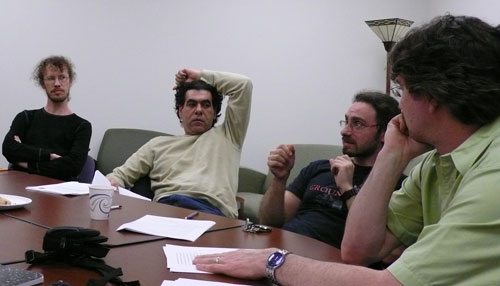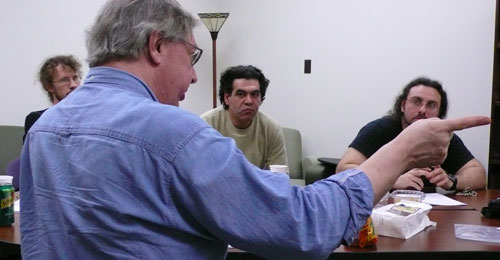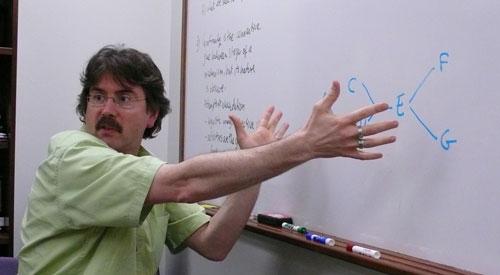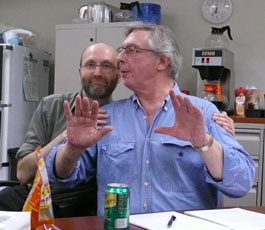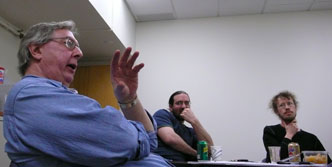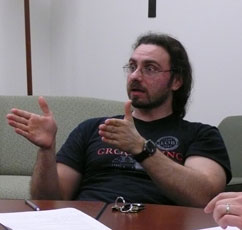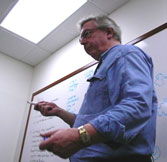
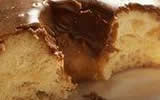
![]()
::: postdoc fellowships
::: senior fellowships
::: resident fellowships
::: associateships
![]()
being here
::: visiting
::: the last donut
::: photo album
::: center home >> being here >> last donut? >> 28 March 2007 |
Wednesday, 28 March 2007 It is now quite late in term and every Visiting Fellow has taken a turn at presenting something to read in our weekly meeting. Fritz thought it was time for something different. He had liked the "Causality, Mechanisms, and Psychology" workshop we'd held a month before and noticed that the topic of mechanisms was hot. There would be many mechanism sessions at the coming ISHPSSB in July in Exeter. So why not prepare by inviting Peter Machamer, our resident mechanism expert, to one of our sessions? Late the week before, Peter's "Explaining Mechanism" had appeared in my mailbox. Our practice is to ask for just a dozen pages so that we all have time to read in preparation. Peter had picked out ten pages for us to focus on. As I scanned them, I could see it was a good choice. They cut to the heart of Peter's new ideas on mechanism and they were sufficiently fluid as to give us plenty of scope for discussion. I arrived a moment or two late for our 5:30 start. I had been a visiting speaker in our Department of HPS's History of Science Core Seminar and that finished at exactly 5:30. It was gratifying to see everyone already seated around the table engaged in relaxed chatter. We'd come a long way from our first meeting at which we each hesitantly introduced ourselves and our interests. Lots of little connections and bonds had formed. One weekend Brad had invited everyone up to Meadville and they had gone bowling. I still wonder what the quiet, rural bowling alley made of an Argentine, a Swede, a Cypriot (and two Americans) trying to make the ball go all the way to the end of the alley. These are just my imaginings; perhaps the group was more proficient. Time to start. "Fritz--you set this up. Would you like to go the whiteboard and write up what you took to be Peter's principal theses?" This was our standard way of starting. It assured the author that we had really read the paper and, by becoming the author, it made it easier for us to take up the author's project. "No way, man," he said, "I've just driven back from Michigan." There was plenty to talk about. Peter had noticed that mechanisms are never given in pure isolation from the chaos of their surroundings. We pick them out and we do so by looking at their goals. Peter had embedded his analysis in a lot of teleology talk and that triggered discussion. How seriously ought we take the idea of mechanisms with purposes? Peter slowly retreated to end states. And then we drifted into the second issue. For Peter, the essence of a mechanism is that it is a productive activity. But what can a philosopher say about activity? It seems to be such a primitive notion that any attempt to reduce it further merely ends in circularity. But if we give up those attempts, have we given up the project of philosophical analysis? As the conversation unfolded and Peter held forth, I started taking photos--a small distraction the fellows have come to accept in good humor. Then, to my delight, Hernan picked up the camera and pointed it at me. I'm always taking the photos so I am never in them. I wheeled my chair over to Peter, who was engaged in an energetic exchange with Brad, who had in turn gone to the whiteboard to draw some figure. Peter smiled and we posed for the camera.
Peter held forth for two hours. He has a trademark booming voice and energetic gestures. His views are delivered with such authority and self confidence that you incline instinctively to agree; and when you don't, the engagements feel imbalanced. I did my best to keep up with him. Later Peter told me he thought I talked too much and I suspect he was right. At 7:30, our standard end point, it just suddenly stopped. It was as if the air had been let out of the balloon. The conversation turned to the serious matter of dinner. We settled on a Portuguese restaurant that, Fritz announced after calling them, neither had a liquor license nor took credit cards. So we went past the liquor store on the way and spent an extraordinary amount of time picking wines. That was another commonality at the table. Fritz is editor of a volume on philosophy of wine; Demetris makes wine; and Peter had written our local paper's wine column and taught wine appreciation classes. Over dinner I heard long, elaborate and not entirely consistent stories about just what happens when wine breathes; and what makes sweet wines sweet; and whether wine gets the right exposure to wood if we just throw some chips in the vat. The lengths of the explanations seemed to grow in inverse proportion to the levels of wine remaining in our bottles. And when Peter announced authoritatively that Salamanca in Spain is within 50 miles of the Portuguese border, I instinctively sided with Peter. In email the next day Fritz reported " Salamanca is 54.96 miles from Ciudad Rodrigo, which is the closest town to the Portugal border… in Spain." He graciously agreed to accept the wine at stake in the wager: "anything red and wet." John D. Norton |
